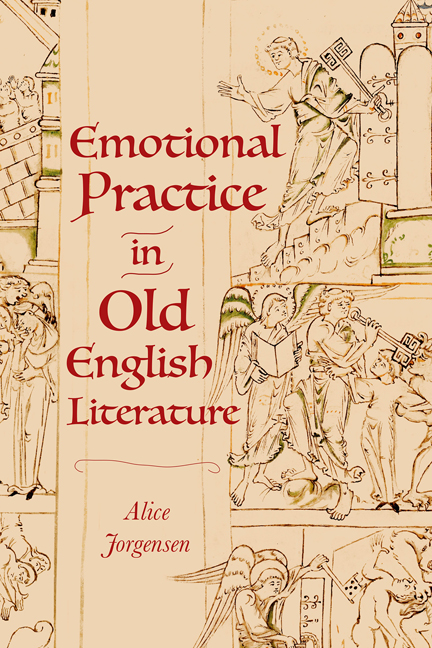Book contents
- Frontmatter
- Dedication
- Contents
- Acknowledgements
- Abbreviations
- Introduction: The Wanderer and Emotional Practice
- 1 Participating in a Heroic Emotional Style: Beowulf
- 2 Uses of the Heroic Style: The Battle of Brunanburh and The Battle of Maldon
- 3 Controlling and Converting Emotion: The Old English Boethius
- 4 Relating to the Divine in the Exeter Book: Christ I and Christ III
- 5 Performing Fear in Old English Homilies
- Conclusion
- Bibliography
- Index
- Miscellaneous Endmatter
2 - Uses of the Heroic Style: The Battle of Brunanburh and The Battle of Maldon
Published online by Cambridge University Press: 09 May 2024
- Frontmatter
- Dedication
- Contents
- Acknowledgements
- Abbreviations
- Introduction: The Wanderer and Emotional Practice
- 1 Participating in a Heroic Emotional Style: Beowulf
- 2 Uses of the Heroic Style: The Battle of Brunanburh and The Battle of Maldon
- 3 Controlling and Converting Emotion: The Old English Boethius
- 4 Relating to the Divine in the Exeter Book: Christ I and Christ III
- 5 Performing Fear in Old English Homilies
- Conclusion
- Bibliography
- Index
- Miscellaneous Endmatter
Summary
The two poems that are the focus of the present chapter offer, of all the texts discussed in this book, the most ostensibly straightforward access to early medieval emotions: they both respond to specific historical events. One, The Battle of Brunanburh, celebrates a victory, that of Æthelstan and his brother Edmund over the combined forces of the Scots under Constantín son of Áed and the Dublin Norse under Óláfr in 937; the other, The Battle of Maldon, mourns the defeat of Ealdorman Byrhtnoth and his men at Maldon in Essex in 991. Both can be read in terms of emotional performance in that they construct and display affective stances towards the events they commemorate; each depicts the emotional reactions of characters (all apparently real historical persons) in a way that implies the emotions of poet and audience. Each also draws on the heroic tradition that has been explored in the previous chapter through Beowulf. Nonetheless, each also presents problems. In the case of Brunanburh, the poem's tone has seemed anomalous or at least unattractive. For John Niles, it invites comparison not with Old English heroic verse but Old Norse praise poetry:
[T]he poet views warfare from a coldly detached stance that is far from what we find in other Old English verse. There are no extravagant ges-tures of heroism here, no insights into human suffering… [Brunanburh] resists our emotional engagement. In much the same way, the hard, compact, daring, and frequently sardonic stanzas of the skalds ask for the audience's admiration and often nothing else.
In the case of Maldon, the poet's attitude to Byrhtnoth (adulatory or condemnatory) has been the topic of seemingly inexhaustible debate, and approaches to this question affect the reading of tone. In addition, while Brunanburh and Maldon are far more closely dated than most Old English poems, for both there is debate over whether they were composed immediately after 937 and 991, respectively, or some years later, and whether for oral delivery or circulation in writing; both dating and performance issues have implications for understanding the emotional work these texts might have done.
- Type
- Chapter
- Information
- Emotional Practice in Old English Literature , pp. 70 - 103Publisher: Boydell & BrewerPrint publication year: 2024



